President Bola Ahmed Tinubu has said that the Federal Government’s ongoing trade reforms, including the unification of the exchange rate, removal of fuel subsidy, and continued port modernisation, were introduced to create a more competitive and trade-friendly environment capable of advancing Nigeria’s continental economic plans.
The President explained that the reforms were part of a broader strategy to position Nigeria as a key player in global trade while strengthening the country’s role within Africa. Tinubu made these remarks on Monday during the opening ceremony of the maiden Customs Partnership for African Cooperation in Trade Summit (C-PACT), held at the State House in Abuja. His message was delivered by Vice President Kashim Shettima.
According to a statement issued on Tuesday by the National Public Relations Officer of the Nigeria Customs Service, Abdullahi Maiwada, Tinubu urged African governments to dismantle inefficient borders, modernise their customs processes, and work towards a unified trade system capable of shaping the continent’s economic future. He said Africa’s prosperity depends on deliberate reforms that transform the continent’s large population and market into a functional economic power bloc.
Tinubu explained that Nigeria’s exchange rate unification, fuel subsidy removal, port upgrades, and enhanced customs digitalisation were all designed to remove long-standing bottlenecks and improve the ease of doing business. He said the reforms aim to prepare Nigeria for stronger participation in regional and global markets.
The President also revealed that Nigeria’s National Single Window project, scheduled to become operational by March 2026, will drastically reduce cargo clearance timelines from the current average of 21 days to fewer than seven days. He added that the platform will help the country meet the digital trade standards required under the African Continental Free Trade Area, positioning Nigeria as a leader in port automation and trade facilitation. He stressed that African nations must show political will, institutional cooperation and readiness to adopt technology that simplifies trade. According to him, integration must be practical, measurable and felt daily by traders, manufacturers and logistics operators.
Speaking during the summit, the Comptroller-General of Customs, Adewale Adeniyi, said his renewed mandate from President Tinubu includes performance indicators tied to the successful implementation of AfCFTA. He explained that the Customs Service had increased its engagement with other African customs administrations in recent months to ensure stronger cooperation on rules of origin, preferential duty application and trade preference administration. He described these as essential elements that determine whether AfCFTA becomes successful or remains a theoretical agreement.
Adeniyi noted that previous regional trade efforts, including the ECOWAS Trade Liberalisation Scheme, faced challenges because many countries did not fully implement their commitments. He said this new continental framework must avoid repeating those mistakes. He added that African economies have varying levels of readiness, but recent engagements have helped build agreement that customs authorities must play a central role in AfCFTA implementation.
He explained that his advocacy for customs inclusion in continental trade discussions led to the creation of C-PACT, a platform for direct collaboration among African customs authorities, regulators, private-sector players and international partners. He also stated that Nigeria’s export volume has risen by more than 30 per cent in the past two years, and the goal now is to channel more of that growth into African markets.
Adeniyi said 30 African Customs administrations registered for the conference, including 22 represented at the Director-General level. He added that the presence of the Secretary-General of the World Customs Organisation, Ian Saunders, at a Nigeria-hosted conference shows strong global support for Nigeria’s growing leadership in customs modernisation.
Also speaking at the event, the Minister of State for Finance, Doris Anite, who represented the Minister of Finance, Wale Edun, said customs reforms are key to Nigeria’s fiscal transformation. She stressed that efficient border operations help reduce the cost of doing business, encourage investor confidence and improve Nigeria’s competitiveness. She also noted ongoing government support for full digitalisation of customs operations, improved risk-management systems and harmonisation with global standards.
The Minister of Trade, Investment and Industry, Jumoke Oduwole, said AfCFTA remains Africa’s most important economic tool but warned that outdated systems and administrative delays still limit its full impact. She highlighted some reforms undertaken with the Customs Service, including tariff concession schedules and the creation of an air-cargo export corridor linking Nigeria with East and Southern Africa.
The Secretary-General of the World Customs Organisation, Ian Saunders, said Africa’s growth projections for 2025 are promising but stressed that customs efficiency will determine whether the continent can fully harness its potential. He said the C-PACT initiative aligns with WCO’s mission of strengthening global customs operations through standardised procedures and capacity building.
AfreximBank’s Executive Vice President for Intra-African Trade, Kanayo Awani, said the bank is helping African countries modernise customs processes through transit-bond guarantees, digital tracking systems and the AfCFTA Adjustment Fund, which supports countries facing tariff revenue losses during implementation.
AfCFTA Secretary-General, Wamkele Mene, praised Nigeria’s leadership and described the Customs Comptroller-General’s role as Chair of the WCO Council as an important advantage for Africa. He said customs authorities must drive trade rules, transit operations and facilitation efforts to ensure that AfCFTA delivers practical results across the continent.
The C-PACT conference, organised by the Nigeria Customs Service in collaboration with Afreximbank and supported by the World Customs Organisation, will hold from November 17 to 19, 2025, in Abuja.
